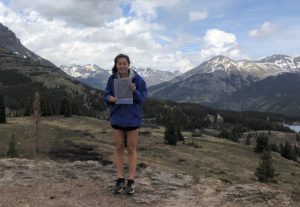 Natalea Cohen’s virtual field camp through Fort Lewis College in Durango, Colorado, challenged her to apply all of the geologic knowledge she’s learned in the last three years as she and her classmates remotely mapped the nearby geologic features.
Natalea Cohen’s virtual field camp through Fort Lewis College in Durango, Colorado, challenged her to apply all of the geologic knowledge she’s learned in the last three years as she and her classmates remotely mapped the nearby geologic features.
Where did you attend field camp?
This summer I went through four weeks of virtual field camp where I used Google Earth, digital images, LIDAR, and Stereonet to explore and analyze field areas including the Henry Mountains, Utah; Merrimac Butte, Utah; Molas Pass, Colorado; a section south of Ouray, Colorado; and Coal Creek/Golden Gate, Colorado.
How did COVID-19 affect your experience of field camp?
COVID-19 had a huge impact on my field camp experience. Rather than camping, hiking, and experiencing the geology in person, I had to draw maps using virtual tools and maps/images mailed to me by my professors. I was disappointed and sad I couldn’t have the opportunity to be with my classmates in person, but I am still thankful for my amazing and persistent teachers who did everything possible to still make it a knowledgeable and fun experience.
What did receiving the J. David Lowell Field Camp Scholarship mean to you?
Receiving the field camp scholarship meant so much to me because it helped aid me in paying the tuition and other field camp fees for supplies. Since field camp was so time intensive and because of the effects of COVID-19, it was not possible to have a separate job. Receiving this award enabled me to relax and not stress about other fees and put all of my focus and energy into having a positive field camp experience.
What did that experience teach you about the geosciences, yourself, and your future career?
Virtual field camp taught me how important and valuable it is to complete remote mapping with satellite imagery and topographic maps before doing in-person exploration of the field site. After week 1 of field camp, my professor explained that the mapping accuracy and coverage from our week of remote work covered more area, more accurately than they ever have from in-person mapping.
This experience also taught me to remain positive and persistent in everything I do despite difficult circumstances and to focus on the factors you can control.
What opportunities did attending field camp provide that you wouldn’t have had otherwise?
Field camp gave me the opportunity to apply the geologic knowledge I’ve learned in the past three years. It challenged me to think and problem solve in ways that were difficult and new. It also provided me with opportunities to practice my mapping skills (reading, creating, and analyzing maps).
In your opinion, how important is field camp for geoscience students?
In my opinion field camp is extremely important for geoscience students. It provides them with important skills and the opportunity to apply their knowledge in a more realistic setting. It also gives them the experience to feel what it’s like to experience the time, energy, and focus that field work requires, whether it’s virtual or in person.
Why should individuals support field camp opportunities for students?
The support of field camp opportunities for students is extremely important and often the only way a student can afford to attend field camp. Field camp is a required class to graduate with a geology degree and it can be quite expensive. Many students are responsible for paying their own tuition and academic fees, while also trying to afford personal living expenses such as food and housing. This is all while trying to focus on school and have a successful academic experience. Field camp opportunities are the very thing that make field camp more affordable and for some, possible.
